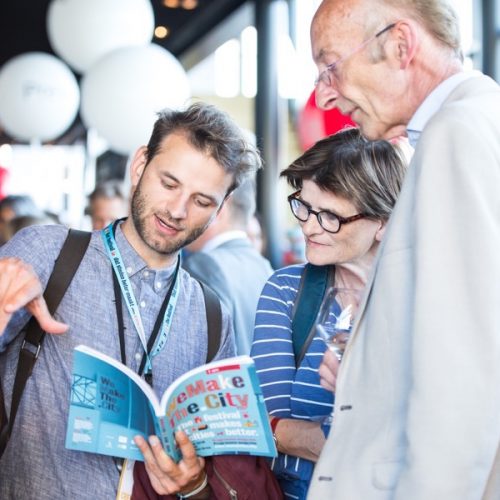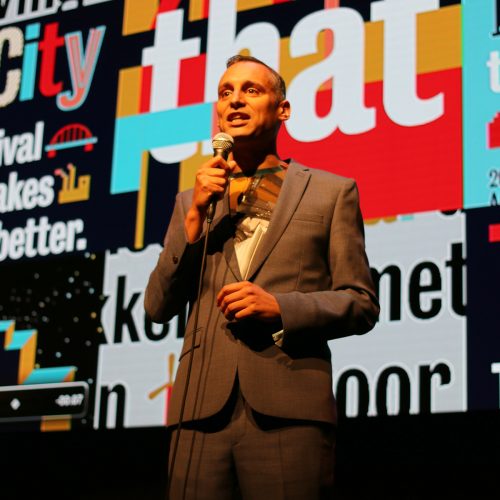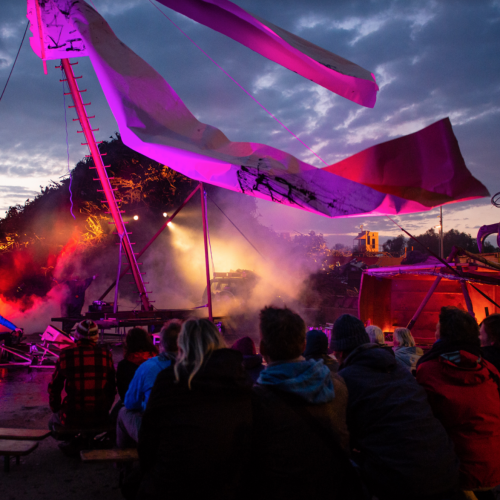New Tokyo Story
Urban ConferenceHow can Amsterdam learn from Tokyo?
Living cities are constantly transforming. While historically the cause and dynamic of this transformation varies per city, globalization has gradually changed site-specific factors into more common, comparable elements. Every major city in every country is involved in an international competition to attract investment, international companies and young, high-quality human resources, while most mature developed societies face an aging population and rapid urbanization. This global dynamic has become undeniable and is a substantial cause for the physical and social transformation of cities. We are not here to criticize this dynamic. Our concern is to make the best of the situation.
With its extreme concentration of population and economic and political activity and its extreme level of aging, Tokyo forms a fascinating urban laboratory with which to investigate and understand the current trend. In this symposium, we have invited Tokyo-based specialists – academics and practitioners - to give a comprehensive explanation of these symptoms of Tokyo’s transformation and of the ways in which the government, companies, and citizens manage its urban future. Amsterdam, a small global city with 2.5 million inhabitants, can learn by examining Tokyo, the world’s biggest city with 38 million inhabitants, and can draw inspiration for new ways of dealing with practical, local knowledge through holistic intervention in a high-dynamic urban fabric under the pressure of globalization.
PROGRAMME
History, Framework and Transformation
9:30 Opening public programme Zef Hemel
University of Amsterdam
9:45 Struggling Cities Naohiko Hino
Architect, historian
10:45 Transformation of Terminal stations Masakazu Ishigure
Tokyo University of Science
11:45 Fiber City: Tokyo 2050 Hidetoshi Ohno
Emeritus Professor Tokyo University
Next Inner-city Culture and Development
14:00 Forth Stage Consumer Atsuhi Miura
Sociologist, marketing researcher
15:30 Inner city development cases Shu Yamamura
Waseda University
16:30 New working relationship
Authorities, companies, and citizens Junko Kunihiro
Oume city coordinator
17:30 Closing Moriko Kira
Architect, Amsterdam/Tokyo
INITIATORS AND SPEAKERS
Zef Hemel (b. 1957) is an urban planner and professor of Urban and Regional Planning at the University of Amsterdam. Since 2014, he is also strategic advisor to the Amsterdam Economic Board. From 2001 to 2004 he was director of the Rotterdam Academy of Architecture and Urban Design. In 2004, he joined the board of Amsterdam’s Urban Planning Department. He published ‘Het toekomstig landschap van de IJsselmeerpolder’ (1994), ‘Creative Cities! (2002), ‘De toekomst van de stad’ (2016), and ‘Dream your own future’ (2017).
zefhemel.nl | Facebook
Moriko Kira (b. 1965) is an architect, has lived in Amsterdam since 1992 and her office operates both in Europe and Japan. Beside her architectural practice she writes books, essays, and curates exhibitions. She published ‘Finding Architecture’ in 2013. In 2010, she was appointed as a professor at Kobe Design University in Japan. In 2004-2010 she was a member of Amsterdam’s Design Committee.
Morikokira.nl | Facebook
Naohiko Hino (b. 1971) is an architect, Head of Hino Architect’s Office. Beside wide-ranging architectural and urban planning work, he is a leading writer, critic, and historian in Japan. Recent publications include two books on Arata Isozaki, one of Japan’s prominent postwar architects, and ‘Is Urban Design Necessary in Japan’. In 2013, he developed the ‘Struggling Cities: From Japanese Urban Projects in the 1960s’ touring exhibition.
hino.nu
Masakazu Ishigure (b. 1986) is an urban historian and Assistant Professor at the Department of Architecture at Tokyo University of Science. In 2016 he published ‘Tokyo Rising from the Postwar Black Markets: SHINJUKU, IKEBUKURO, and SHIBUYA after 1945’. In this book, he conducted extensive research on the history of Tokyo railway stations and neighbourhoods.
Facebook
Hidetoshi Ohno (b. 1949) is Emeritus Professor at the University of Tokyo and the Principal of architectural firm APL design workshop. He has designed numerous architectural works and has been awarded major prizes. He published ‘Fibercity Tokyo 2050’ in 2006, which was welcomed with widespread international debates. The updated publication in 2016 ‘Fiber City, A Vision for Cities in the Age of Shrinkage’ proposes a new theory of urbanism for shrinking cities in the post-industrial era, connecting ‘fiber units’ in the city to redesign the information, transportation, and industrial networks, as well as the landscape.
APL design workshop | Fibercity 2050
Atsushi Miura (b. 1958) is a sociologist, marketing researcher, and writer. He conducts research on consumer society, family, youth, social class, cities (especially on the transformation of suburbia) and other aspects of modern life. As a futurist, he proposes what he calls ‘social design’. His publications include ‘Lower-Class Society’, ‘Tokyo is Being Shrunk from the Suburbs’, and ‘The Rise of Sharing: Fourth-Stage Consumer Society in Japan’. http://culturestudies.jp
Shu Yamamura (b. 1980) is an urban planner and researcher. He is an assistant professor of Planning at the Department of Architecture at Waseda University, Tokyo. His research interests lie at the crossroads of interdisciplinary research between urban planning and social sciences. Current research projects and interests relate to creative industry clusters in Tokyo, knowledge-city policies, inner city problems and revitalization, and urban structural transformation of the Tokyo Metro Area.
Junko Kunihiro (b. 1976) is the town manager of Ome City Center Vitalization Council since 2013. Authorized by local government and Chamber of Commerce and Industry, she organizes the area-management team and plans and operates various projects to solve regional issues and improve the function of the depressed city center. Graduated from Keio University in economics in 1999, she worked in the Bank of Japan, Research, and Statistics Division for 4 years. After she graduated from Tokyo University of Science in an architectural course in 2007, she changed her career to architectural and urban management. In 2010-2012, she worked as a vice president of Chinese local design company in Beijing.
Facebook | hclab. | Instagram
This event is free to visit with your Festival Pass. Go to our ticket page for more information.
Credits photo: Dawid Sobolewski
Saturday 23 June
09:30 - 17:30
Pakhuis de Zwijger, Piet Heinkade 179, 1019 HC, Amsterdam


